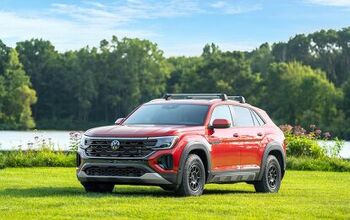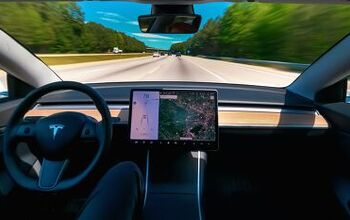Chevy Cancels US-Market Plans For Orlando Compact MPV
Chevrolet has had a difficult time deciding if its Cruze-based MPV, known as the Orlando, is a good fit for the US-market. Initially, Chevy debuted the Orlando concept at the Paris auto show, and said it had no plans for a US-market version. Then it was approved for the US ahead of the 2009 Detroit Auto Show, and now, according to Automotive News [sub], it’s off again. The (up to) seven-passenger MPV, built on GM’s “Delta II” compact architecture will be sold in Europe, Asia, and even Canada… just not in the US. Chevy spokesfolks explain:
The best thing to do for Chevrolet is to focus on the brands we’ve already brought to market: the Traverse, Equinox, Malibu and, soon to come, the Cruze. We feel that with those vehicles, Chevrolet has plenty of options for the modern family.
Of course, Chevy sells all three of those vehicles in Canada as well… so how are these three options “plenty” for US consumers, but not for our friendly neighbors to the North?
And then there’s one more crucial consideration: with a Volt MPV5 being shown at the Beijing Auto Show, there’s a good chance the five-seat plug-in is coming to the US. And because the MPV5 looks so much like an Orlando with a Volt grille slapped on, GM’s planners might have thought that the MPV5 would be more successful in the US as a plug-in -only model. And maybe they’re right. Still, the Orlando is one of the more compelling (if awfully named) vehicles to be teased by GM of late… we can’t say we’re thrilled to see the US-version canceled.
More by Edward Niedermeyer
Latest Car Reviews
Read moreLatest Product Reviews
Read moreRecent Comments
- MaintenanceCosts Nobody here seems to acknowledge that there are multiple use cases for cars.Some people spend all their time driving all over the country and need every mile and minute of time savings. ICE cars are better for them right now.Some people only drive locally and fly when they travel. For them, there's probably a range number that works, and they don't really need more. For the uses for which we use our EV, that would be around 150 miles. The other thing about a low range requirement is it can make 120V charging viable. If you don't drive more than an average of about 40 miles/day, you can probably get enough electrons through a wall outlet. We spent over two years charging our Bolt only through 120V, while our house was getting rebuilt, and never had an issue.Those are extremes. There are all sorts of use cases in between, which probably represent the majority of drivers. For some users, what's needed is more range. But I think for most users, what's needed is better charging. Retrofit apartment garages like Tim's with 240V outlets at every spot. Install more L3 chargers in supermarket parking lots and alongside gas stations. Make chargers that work like Tesla Superchargers as ubiquitous as gas stations, and EV charging will not be an issue for most users.
- MaintenanceCosts I don't have an opinion on whether any one plant unionizing is the right answer, but the employees sure need to have the right to organize. Unions or the credible threat of unionization are the only thing, history has proven, that can keep employers honest. Without it, we've seen over and over, the employers have complete power over the workers and feel free to exploit the workers however they see fit. (And don't tell me "oh, the workers can just leave" - in an oligopolistic industry, working conditions quickly converge, and there's not another employer right around the corner.)
- Kjhkjlhkjhkljh kljhjkhjklhkjh [h3]Wake me up when it is a 1989 635Csi with a M88/3[/h3]
- BrandX "I can charge using the 240V outlets, sure, but it’s slow."No it's not. That's what all home chargers use - 240V.
- Jalop1991 does the odometer represent itself in an analog fashion? Will the numbers roll slowly and stop wherever, or do they just blink to the next number like any old boring modern car?































Comments
Join the conversation
If it had the stickshift and the sliding doors, it could compete with the Mazda5. They don't sell well, but if gas prices spike, then people will trade their Siennas, Odysseys, and Grand Caravans (and possibly their Highlanders, Pilots, and Lambdas) for something like this.
GM still doesn't want to sell small cars. They don't ever make them money, and they are always crap anyway. The Japanese and Hyundai have that market cornered. I dont think I'd want anything designed by Gm Korea (Daewoo) anyway.